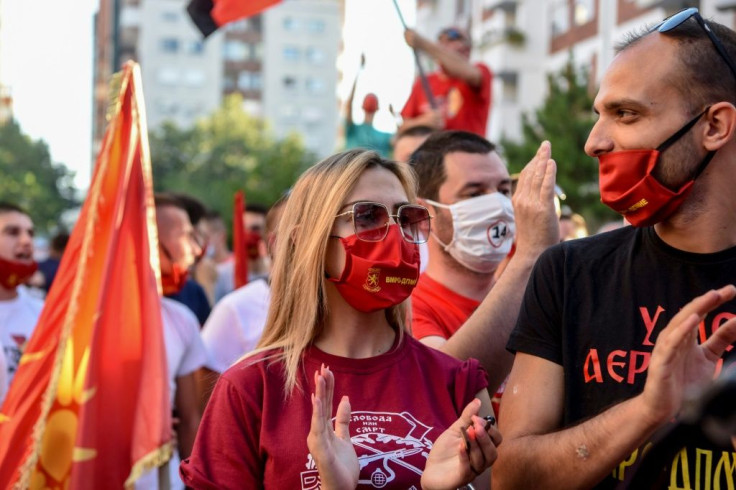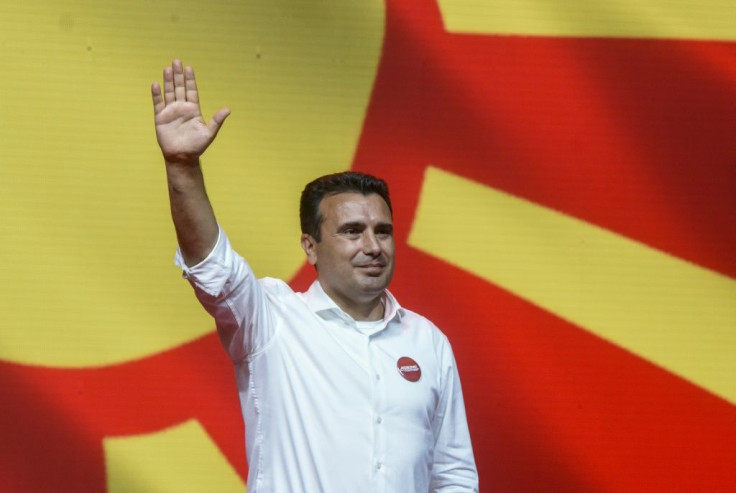Polarised North Macedonia Votes Amid Virus Surge

North Macedonia heads to the polls Wednesday to elect a government in the midst of a resurgence of coronavirus cases, which has fuelled a bitter blame-game between rival camps.
The pandemic has heightened divides in a Balkan state whose acrimonious political scene has lurched from crisis to crisis in recent years.
On one side are the Social Democrats led by former prime minister Zoran Zaev, who is touting his success in ushering the country into NATO and getting a green light to start EU membership talks.
His right-wing rivals in VMRO-DPMNE, however, argue that the price of a name change was too high -- Skopje added "North" to the country's name last year in order to end a decades-old row with Greece, which claims exclusive rights to the name Macedonia for its own province.
While such identity debates may have been at the forefront of politics several months ago, the pandemic has changed the game, with the two sides trading accusations for the latest rise in virus cases.
For the past six months the country has been run by a shared caretaker cabinet with members from both parties who have struggled to unite in the face of the crisis.
The interim government -- which lacks a parliament -- was only supposed to last until April, when a snap poll was originally scheduled.
The postponed vote is now being held amid a much larger wave of infections, which could dampen turnout.
"I'm not going to vote," said 38-year-old Slobodan Katusevski from Skopje, reflecting health fears in the capital.
"They say it is as safe as going into the supermarket, but I need to go to the supermarket, I do not have to vote," he added.
After an initial outbreak was contained by mid-May, infections have sky-rocketed from the single digits to more than 150 daily, reaching nearly 8,000.
More than 375 people have died in the country of around two million, the second highest death toll in the Western Balkans behind much larger Serbia.
Health authorities have issued special protocols for the election, including two days of early voting for infected patients and the infirm.

Opinion polls put the two main camps in a close contest with less than a quarter of the vote share each.
In previous years, the main party representing ethnic Albanians, the Democratic Union for Integration (DUI), has played a kingmaker role, giving it a seat in power for 16 out of the past 18 years.
This time they have a new demand: naming their candidate as prime minister in exchange for an alliance.
The campaign slogan is "Why Not?".
Composing around a quarter of the population, the Albanian minority has long complained of social and economic discrimination.
Yet some critics have accused DUI of playing the ethnic identity card to draw attention away from its own lacklustre policy platform and allegations of graft.
Both Zaev -- who has allied with another smaller ethnic Albanian party -- and his opposition rival Hristijan Mickoski have dismissed the PM demand as "blackmail".
Zaev's coalition has promised to focus on fixing an economy where salaries average 420 euros ($475) a month, sending huge numbers of young people abroad.
"We are part of NATO and are starting the negotiations with the EU... now we will work at home on the economy," he said in a recent television appearance.
The former PM has warned that a victory for VMRO-DPMNE would be a return to the dark days of former strongman Nikola Gruevski, who ruled the country for a decade until 2016.
He has since fled to Hungary to escape a corruption sentence.
But Zaev's camp is also facing its own graft accusations.
Mysterious audio and video wiretaps purporting to show alleged wrongdoing have emerged on social media to discredit both main parties.
Analysts say it is difficult to know how these smear campaigns will sway undecided voters, some of whom may choose to stay home.
"I think that the final outcome of this elections will be uncertain until the very end", said political analyst Ljupco Petkovski.
© Copyright AFP {{Year}}. All rights reserved.




















